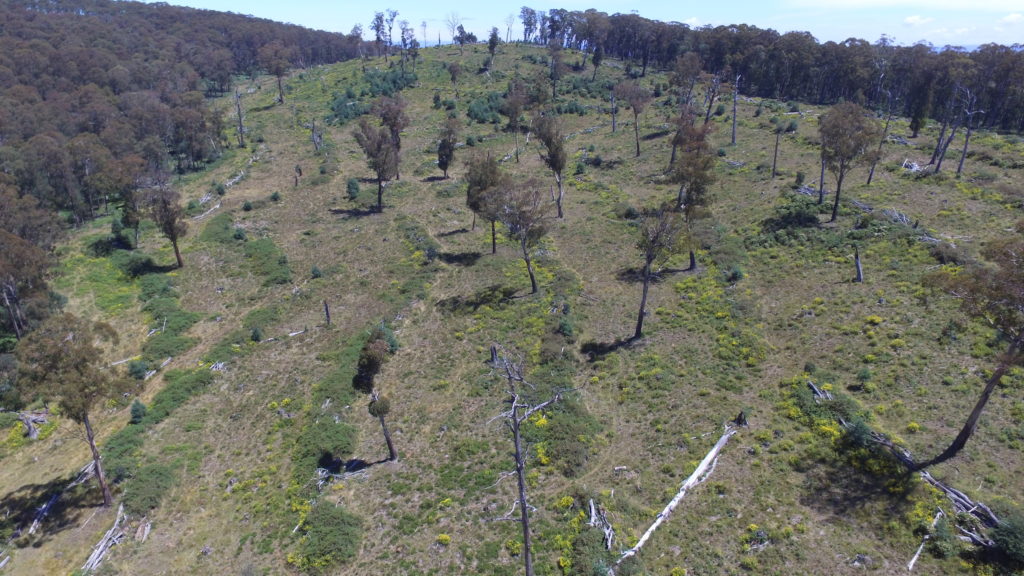The revelations of the last few weeks have erased any doubts that the Victorian government’s logging agency VicForests has gone rogue and needs to go.
After a string of allegations involving illegal logging, failure to regrow forests, and spying on environmentalists – the Victorian government-owned VicForests has now been referred to the state’s anti-corruption watchdog IBAC as well as the Victorian Ombudsman.
On top of reports of illegal steep slope logging in water catchment areas vital to Melbourne’s water supply, we also learnt that VicForests has employed private investigators to follow environmental activists around and dig for ‘dirt’ on them.
A new report released last week by 19 Victorian environment groups After the Logging – failing to regrow Victoria’s native forests, based on data obtained under Freedom of Information laws and ground-checks of logged areas in the public native forests of eastern Victoria, shows VicForests is failing to carry out its most basic responsibility which is to regrow native forests after they are logged.
It exposes for the first time how VicForests is failing to regrow forests – despite its claims to be doing so. The Andrews government and the Commonwealth promised that logged forests will be regrown or regenerated “like for like”.

Tom's Track, a section of native forest in Mount Delusion, was logged in 2010/11. It was handed back to the public in 2015 after being officially deemed 'regenerated'
VicForests’ website features the tagline “we grow it back”. It goes on to state: “After harvesting, through careful planning and replanting, we regrow all harvested areas with the same type of forest that was originally there for the future enjoyment of generations to come.”
But the new evidence presented in this report emphatically contradicts these claims.
According to VicForests fewer than 15% of logged coupes fail to regenerate within three years at “first attempt”. In fact, this three-year benchmark applies not to forests but to eucalypt seedlings, and the failure rate is 30%, twice what VicForests claims. In Mountain Ash forests, the failure rate is over 50%.
VicForests claims that all logged areas are regrown, but the reality is that some places are no longer forests at all. They have been turned into weed-infested blackberry patches and wastelands of bracken and grass. Elsewhere, colonising species such as wattles have replaced the original eucalypts. Feral animals and weeds are rife.
VicForests keeps its costs down by automatically shifting forest management responsibility to the environment department when it determines regeneration is successful, usually within three years of logging.
We found examples across the forests of eastern Victoria of logged areas that VicForests had handed back as ‘regenerated’ but were anything but. The cost of fixing the mess falls to the public.
The root causes of regeneration failure are twofold: the systemic failures of Victoria’s forest management system and the role of VicForests.
VicForests’ core business is to sell logs from public native forests but its decisions about the nature, intensity and distribution of logging affect all aspects of our forest environments.
Governments have allowed VicForests to operate with almost complete autonomy, a high level of secrecy and no effective oversight or accountability despite the pervasive environmental consequences of its activities. It is distrusted by large sections of the community — and with good reason.
The Commonwealth, which accredits Victoria’s forest management system as meeting its environmental requirements, is complicit in its failure.
In 2019, the Victorian government announced that native forest logging would end in 2030. But while evidence accumulates of unlawful logging and regeneration failure, logging continues unabated. Every three days logging starts in a new forest area. That means more impacts on wildlife, water and climate and more regeneration failure coming down the line.
It is irresponsible and unsustainable. West Australia has announced logging will transition out of native forests no later than the end of 2023. Victoria should follow suit.
VicForests should be abolished and an independent authority established to manage the ecological, cultural and social dimensions of the transition out of native forest logging. First Nations Traditional Owners should be at the forefront of the process.
The end of logging is a historic once-in-a-generation opportunity to recover and revitalise Victoria’s diverse and beautiful native forests and by doing so help protect the climate, wildlife, water and culture. After decades of widespread logging, it is time for Victorians to face up to the consequences, including regeneration failure, and act before it is too late.
Margaret Blakers (OAM) is an independent researcher, founder and former Director of the Green Institute and former Chief of Staff for Senator Bob Brown.